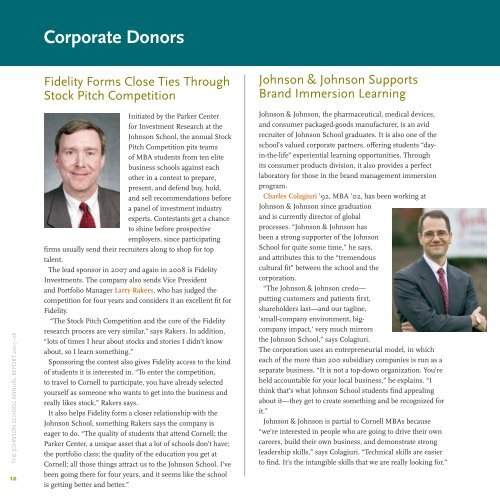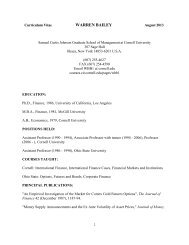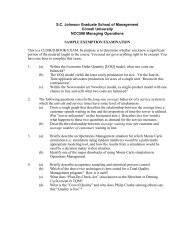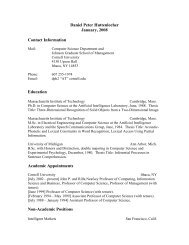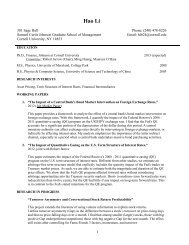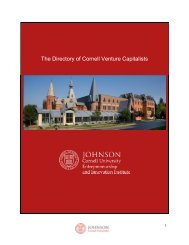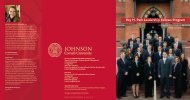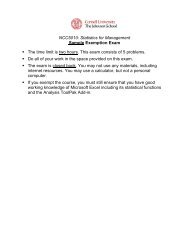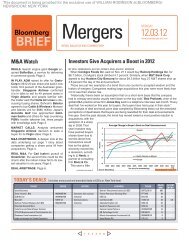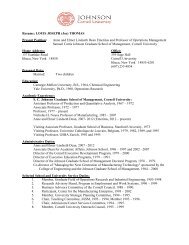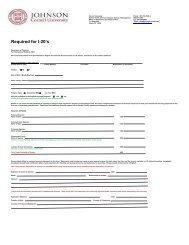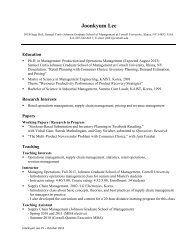The Johnson School Annual Report 2007–2008 - Johnson Graduate ...
The Johnson School Annual Report 2007–2008 - Johnson Graduate ...
The Johnson School Annual Report 2007–2008 - Johnson Graduate ...
You also want an ePaper? Increase the reach of your titles
YUMPU automatically turns print PDFs into web optimized ePapers that Google loves.
Corporate Donors<br />
Fidelity Forms Close Ties Through<br />
Stock Pitch Competition<br />
<strong>Johnson</strong> & <strong>Johnson</strong> Supports<br />
Brand Immersion Learning<br />
THE JOHNSON SCHOOL ANNUAL REPORT 2007–08<br />
12<br />
Initiated by the Parker Center<br />
for Investment Research at the<br />
<strong>Johnson</strong> <strong>School</strong>, the annual Stock<br />
Pitch Competition pits teams<br />
of MBA students from ten elite<br />
business schools against each<br />
other in a contest to prepare,<br />
present, and defend buy, hold,<br />
and sell recommendations before<br />
a panel of investment industry<br />
experts. Contestants get a chance<br />
to shine before prospective<br />
employers, since participating<br />
firms usually send their recruiters along to shop for top<br />
talent.<br />
<strong>The</strong> lead sponsor in 2007 and again in 2008 is Fidelity<br />
Investments. <strong>The</strong> company also sends Vice President<br />
and Portfolio Manager Larry Rakers, who has judged the<br />
competition for four years and considers it an excellent fit for<br />
Fidelity.<br />
“<strong>The</strong> Stock Pitch Competition and the core of the Fidelity<br />
research process are very similar,” says Rakers. In addition,<br />
“lots of times I hear about stocks and stories I didn’t know<br />
about, so I learn something.”<br />
Sponsoring the contest also gives Fidelity access to the kind<br />
of students it is interested in. “To enter the competition,<br />
to travel to Cornell to participate, you have already selected<br />
yourself as someone who wants to get into the business and<br />
really likes stock,” Rakers says.<br />
It also helps Fidelity form a closer relationship with the<br />
<strong>Johnson</strong> <strong>School</strong>, something Rakers says the company is<br />
eager to do. “<strong>The</strong> quality of students that attend Cornell; the<br />
Parker Center, a unique asset that a lot of schools don’t have;<br />
the portfolio class; the quality of the education you get at<br />
Cornell; all those things attract us to the <strong>Johnson</strong> <strong>School</strong>. I’ve<br />
been going there for four years, and it seems like the school<br />
is getting better and better.”<br />
<strong>Johnson</strong> & <strong>Johnson</strong>, the pharmaceutical, medical devices,<br />
and consumer packaged-goods manufacturer, is an avid<br />
recruiter of <strong>Johnson</strong> <strong>School</strong> graduates. It is also one of the<br />
school’s valued corporate partners, offering students “dayin-the-life”<br />
experiential learning opportunities. Through<br />
its consumer products division, it also provides a perfect<br />
laboratory for those in the brand management immersion<br />
program.<br />
Charles Colagiuri ’92, MBA ’02, has been working at<br />
<strong>Johnson</strong> & <strong>Johnson</strong> since graduation<br />
and is currently director of global<br />
processes. “<strong>Johnson</strong> & <strong>Johnson</strong> has<br />
been a strong supporter of the <strong>Johnson</strong><br />
<strong>School</strong> for quite some time,” he says,<br />
and attributes this to the “tremendous<br />
cultural fit” between the school and the<br />
corporation.<br />
“<strong>The</strong> <strong>Johnson</strong> & <strong>Johnson</strong> credo—<br />
putting customers and patients first,<br />
shareholders last—and our tagline,<br />
‘small-company environment, bigcompany<br />
impact,’ very much mirrors<br />
the <strong>Johnson</strong> <strong>School</strong>,” says Colagiuri.<br />
<strong>The</strong> corporation uses an entrepreneurial model, in which<br />
each of the more than 200 subsidiary companies is run as a<br />
separate business. “It is not a top-down organization. You’re<br />
held accountable for your local business,” he explains. “I<br />
think that’s what <strong>Johnson</strong> <strong>School</strong> students find appealing<br />
about it—they get to create something and be recognized for<br />
it.”<br />
<strong>Johnson</strong> & <strong>Johnson</strong> is partial to Cornell MBAs because<br />
“we’re interested in people who are going to drive their own<br />
careers, build their own business, and demonstrate strong<br />
leadership skills,” says Colagiuri. “Technical skills are easier<br />
to find. It’s the intangible skills that we are really looking for.”


